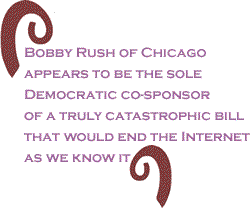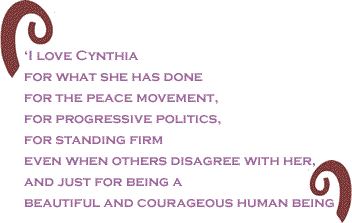
|
|||||||||||||||||||||
 |
|||||||||||||||||||||
 |
|
For a significant chunk of white America including its ruling elite, the best and most desirable state of race relations is achieved when black people just shut the heck up. While this condition is not obtainable in the real world, the evacuation of New Orleans appears locally to have yielded for them, the next best thing. The city's black population has been largely dispersed, made to go away. Over the ensuing months, innumerable roadblocks have been strewn in the way of their return by private agencies such as the Red Cross and insurers, and from a constellation of federal, state and local governmental entities. Last week's BC cover story, “New Orleans is Our Gettysburg” explained how farcical elections, in which the participation of the city's black residents was massively and selectively hindered, are intended to put the stamp of legitimacy upon the dispossession and exile of much of black New Orleans. Widely referenced and linked to from around the net by such sites as BuzzFlash, the story generated quite a few emails from individuals who probably are not regular BC readers. One of the very few of these that was nearly civil or printable came from Anne McNeal:
At the risk of appearing sarcastic, a tone of equanimity is far easier to adopt and sustain when someone else's community and family has been dispossessed instead of one's own. No current white resident of the Crescent City can possibly dodge the fact that she or he is the beneficiary of unearned privilege vis-a-vis the hundreds of thousands of black residents who cannot return, and who, under the present dispensation can expect neither accounting nor apology for their lost homes, property, their unburied and unaccounted for family members and their dispersed communities.
The singling out of Georgia's Rep. Cynthia McKinney for the sins of demanding a sane and even handed foreign policy in the Middle East, for questioning the war in Iraq, and for having been first to demand an investigation into what the government knew or should have known prior to the attacks of September 11, 2001 continues. So does the telling silence of established black leadership including most of the Congressional Black Caucus. Thankfully, there are exceptions. BC received the following communication last week from Dr. E. Faye Williams, Esq., Chair of the National Congress of Black Women.
Dr. Williams has it about right. Everyone has a certain amount of good credit to exhaust, and Rep. McKinney's record of public service has earned her more than most. She has also earned the unremitting hostility of the establishment media who have knowingly lied about much bigger things than what did or didn't happen at a Capitol Hill checkpoint.
Reportedly, white and black Capitol Police are bitterly divided over the McKinney incident, with African Americans insisting the Georgia congresswoman is being unjustly harassed, while many white officers maintain that she's only getting what she has coming. Howard University's Dr. Paula Matabane was kind enough to share with BC a letter she wrote to the Washington Post's Robin Givhan in response to an April 7 fluff story on Rep. McKinney, which seemed to reduce the discussion around the Georgia congresswoman and her career to trivializing speculations about her hairdo:
Like Drs. Williams and Matabane, we
support Rep. McKinney without reservations. So does BC reader Ed
Rynearson:
While we endorse the spirit of Mr.
Rynearson's accessorizing suggestion, it is doubtful that the congresswoman
will adopt such a measure any time soon.
Richardson has a serious point. It's easy to understand why corporate media want to direct us away from what we can gain by collective action and keep us exclusively focused on individual real estate, bond and stock market manipulations as the sole responsible road to ensuring economic security for our families. It's not nearly as easy to explain why much of our so-called black leadership class has the same fixation, unless these leaders owe greater allegiance to corporate America than they do to us.
The title of Tavis's 2006 morning SOBU panel was “Economic Empowerment: Building and Leveraging Wealth in the African American Community.” Arguably, the December 2005 NYC transit strike exerted greater leverage and did more to maintain “wealth building” and economic security for a larger number of black families than any three or four of Tavis's bankers, entrepreneurs and investment advice columnists have done in their entire careers. Again, it's appropriate to wonder just who is distracting who, and from what. Over the last week we have become aware that Congressional Black Caucus member Bobby Rush of Chicago appears to be the sole Democratic co-sponsor of a truly catastrophic bill that would end the Internet as we know it and leave it up to AT & T, Verizon and other ISPs and owners of the Internet backbone to determine what content users will be allowed to access. This is not exaggeration, and not hyperbole. Daily Kos explains the issue this way
A simple and graphic explanation of network neutrality is available at link. Turning the public internet into their private toll road has been the Holy Grail of telco monopolies for more than a decade. Congressman Rush and the telco monopolies have brought into existence a national coalition called Save the Internet because this is precisely what is at stake. As if that were not enough, the legislation will create a national cable TV franchise, invalidating the hard-won agreements negotiated between communities and cable TV companies around the country which guarantee a small measure of access to public service, educational and community affairs programming, and which require cable companies to offer service to the poorer, mostly black areas of cities and towns across the country to which they otherwise would refuse to “build out.” Having such a national franchise means that new giant corporations entering into the cable business could bypass local communities and governments and cut a single deal on the federal level alone. Good for them. Bad for cable customers, and worst of all for those of us who live in the parts of town which will not be offered “lightspeed service” or “priority service” or whatever your local tentacle of the telco monopolies are calling it.
BC contacted the congressman's office by phone to inquire about the proposed legislation and have yet to receive a reply. We are not the only ones. For more than a month, the good people at Chicago Media Action have tried too. They finally printed an open letter to the congressman which you can read here. Some of us go way back with the congressman from the first district of Illinois, back to when he was a comrade of Fred Hampton, and worked tirelessly to end the exploitation of man and woman by man. Back then, corporate and governmental evildoers were actually afraid of Bobby Rush, and for good reason. Who's afraid of Bobby Rush now? Maybe we all should be. (As BC went to print, we learned that two Blacks on Rep. Rush's committee joined two other Democrats in voting for the GOP/teleco industry's bill. The CBC members are Edolphus Towns (NY) and Albert Wynn (MD). The bill now goes to the full House. - The Editors.) According to some sources, the apparent goal of Rush, of his Republican co-sponsors and of the telecommunications industry appears to be to rush this privatization of public resources and of the vital public space for information and debate itself into law as quickly as possible before the summer recess and mid-term elections. They must not be allowed to succeed. BC urgently recommends that readers sign the petition to prevent the corporate hijacking of the Internet, as more than a quarter million already have. Email your own representative in Congress too, and let him or her know how you feel about giving the internet away to Verizon, Comcast and AT&T. And as a last step you might phone the DC office of CBC chairman Mel Watt of North Carolina at (202) 225-1510 or fax him at (202) 225-1512 to inform him of your concern that Rush's legislation will deprive black communities of the limited protection against redlining and discrimination in the provision of cable service that they now enjoy. He'll appreciate it. For more information on the incalculable damage which will be done by this ill-advised legislation, we strongly suggest our readers check out some of the following sites and share the information with everyone who uses email on the internet. While you still can.
Finally, Counterpunch magazine is a daily must-read for most of us at BC, and should be for you too. We take this opportunity to highly recommend our readers check out Alexander Cockburn's article “Obama's Game” which is notable not just for its deconstruction of where the African American junior senator from Illinois is, but for what he says about the current state of the rest of the Congressional Black Caucus, as well as Move On and the class of self-serving political consultants who actually spend most of the corporate billions raised to pay for political campaigns. Assuming that Congressman Rush's telco bill does not become law any time soon, we intend to be here next week. We answer as much of our email as possible, generally privately, but some of it publicly in this space. Send it to us at [email protected]. |
|
| Home | |
Your comments are always welcome. Visit the Contact Us page to send e-Mail or Feedback or Click here to send e-Mail to [email protected] e-Mail re-print notice
If you send us an e-Mail message we may publish all or part of it, unless you tell us it is not for publication. You may also request that we withhold your name. Thank you very much for your readership. |
|
| April 27, 2006 Issue 181 |
||||||||||||||
|
||||||||||||||
|
||||||||||||||
| Printer Friendly Version of article | ||||||||||||||
 |
||||||||||||||
 |
||||||||||||||
| |
||||||||||||||
| |
||||||||||||||

































